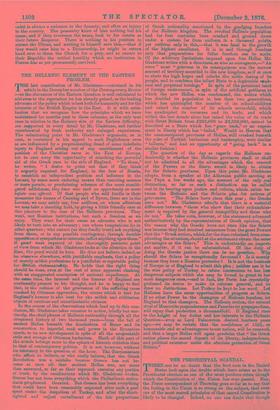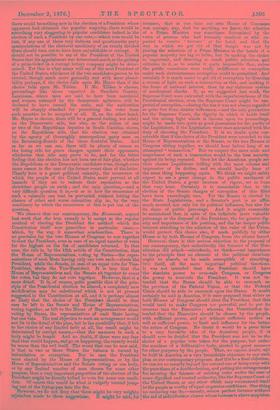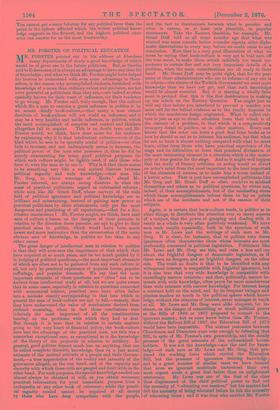THE PRESMENTAL SCANDAL.
THERE can be no doubt that the best men in the United States look upon the doubts which have arisen as to the Presidental election as one of the most perilous crises though which the Constitution of the Union has ever passed. Nay, the Times correspondent of Thursday goes so far as to say that the feeling in the Union is so strong on the subject, that even one of the most sacred principles of that sacred Constitution is likely to be changed. Indeed, no one can doubt that though there would be nothing new in the election of a President whose opponent had obtained the popular ninjority, there would be something very staggering to popular confidence indeed in the election of such a President by one vote,—which vote would be lost, if any one of three very dubious and questionable party manipulations of the electoral machinery of an evenly divided State should turn outto have been unjustifiable or corrupt. It should not be possible to say of the President of the United States that his appointment was determined tench as the gaining of a prize-.ticket in a corrupt lottery company might be deter- mined. Yet this is what many will say of the next President.of the United States, whichever of the twuoandidates proves to be elected, though much more generally and with more plausi- bility perhapa, if the choice falls upon Mr. Hayes than if the choice falls upon Mr. Tilden. If Mr. Tilden is chosen, preceediugs like those reported in Ouachita County, Louisiana, where men are said to have been murdered and women outraged by the democratic agitators, will be declared to have turned the Beale, and the authorities will be sharply attacked for permitting the votes from such counties to be accepted at all. If, on the other hand, Mr. Hayes is chosen, there will be a general feeling, not solely on the Democratic side, but also, as the action of one or two of the Republican deputies in South Carolina shows, on the Republican side, that his election was obtained by the agency of thoroughly unscrupulous party men on the Returning-Boards of the three doubtful States. And as far as we can see, there will be plenty of reason on the losing side for grave charges against their opponents, whichever that side may prove to be, and for the, bitter feeling that the election has not been one of fair-play, whether the Republican or the Democratic candidate wins, though even more reason in the case of the former event than of the latter. Clearly here is a great political calamity, the recurrence of which the people of the United States must prevent at all bagarda if they are to redeem their reputation as the shrewdest people on earth ; and the only question,—and a very difficult question it is,—is as to how the recurrence, of such a calamity can best be prevented without letting the chance of other and worse calamities Slip in, by the very machinery by which the recurrence of this is put out of the question, We observe that our contemporary, the ,Econondet, argued last week that the true remedy is to accept as the regular method of electing the. President the method which the Constitution itself now prescribes in particular cases,— which, 'by the way, it somewhat misdescribes. There is no provision for the two Houses of Congress to vote together to elect the President, even in case of an equal number of votes for the highest on the list of candidates returned. In that case, the rule is, by the 12th article of the Constitution, that -the House of Representatives, voting by States—the repre, sentatives of each State having only one vote each—elects the President, while the Senate, in case,of ran equal vote for Vice, President, elects the Tice-President. It is true that the House of Representatives and the Senate sit together to count the votes, but they do not vote together. However, that is a mere detail. It is, of course, quite possible that if the prin- ciple of the Presidental election be altered, a completely new modification may be substituted which is not at present suggested, in the Constitution at all, and it is perhaps almost as likely that the choice of the President should in that case be left to the senate and Horan of Representatives, voting together, as left to the House of Representatives alone voting by States, the representatives of each Stale having but one vote. The real objection to such an, arrangement would not lie in the detail of the plan, but in the possibility that, if left to the choice of any limited body at all, the result might be determined by corrupt means,that the waverers in such a body might be bought. And no .doubt, if there were any fear -that that would happen,,and go on happening, the remedy would be worse than the evil itself. The worst that can be now said, is that in two or three States the balance is turned by intimidation or corruption. But in case the President were elected by the House of Representatives, or by the House of Representatives and the Senate voting as one body, or by any limited number of men chosen for sonic other purpose, then a very important proportion of the electors of the President might be directly bribed to vote for some one candi- date. Of course this would be what is vulgarly termed junip, lug out of the frying-pan into the fire. However, we do not deny that there might be very weighty rejoinders made to these euggeatioee. It might be said, for instance, that at one time .our own House of Commune was corrupt, nay, that for anything we know, the selection of a Prime Minister was sometimes determined by the votes of persons who had formerly received or who ex- pected to receive favours ' at his hand, and that the way in which we got rid of that danger was not by placing the selection of a Prime Minister in the hands of a popular majority too big to bribe, but by making the choice so important, and directing so much public attention and criticism to it, as to render it quite impossible that, unless the public conscience were really indifferent to corruption under such circumstances, corruption could be permitted. And certainly it is much easier to get rid of corruption by directing a stream of light en such a transaction as this, and making it the focus of national interest, than by any elaborate system of mechanical checks. If, as we suggested last week, the Supreme Court were entrusted with the superintendence of the Presidential election, even the Supreme Court might be sue- pected of corruption,—during the war it was not always regarded as quite free from sinister influences,--,and the only guarantees for the Supreme Court, the dignity in which it holds itself and the strong light which is thrown upon its proceedings, might be made into quite as good. guarantees for the purity of the Legislature, if the Legislature were once entrusted with the duty of choosing the President. it is no doubt quite con- ceivable that if the choice of the President were accorded to the House of Representatives or the Senate, or the two Houses of Congress sitting together, we should hear before long of an attempted " transaction." But we suspect the mere scale and importance of such a transaction would be the beet security against its being repeated. Once let the American people see their chosen Legislature trifling with the most solemn and impressive of its duties, and we should hardly hear of the same thing happening again. We -think we might safely expect to see a great change in the public sentiment of the United States, a great increase of rigour, set in from that vexy. hour. Certainly it is remarkable that in the election of the Senate charges of corruption of this leind have been exceedingly rare. Yet the Senate is elected by the State Legislatures, and a Senator's post is an Mee much coveted, not only for its political influence, but also for its share of public patronage. And it might reasonably be maintained. that, in spite of the infinitely more valuable patronage at the disposal of the. President, the far greater dig- nity and importance of his position, and the far deeper public interest attaching to the selection of the ruler of the 'Union, would protect this choice also, if made publicly by either House or by both Houses of Congress, from the abuses feared. However, there is this serious objection to the proposal of our contemporary, that undoubtedly the framers of the. Con- stitution dfd attach—mistakenly, we think—vast importance to the principle that no element of the political structure ought to absorb, or 'be made susceptible, of absorbing, into itself, all the more important political functions. It was not intended that the President should have the absolute power to over-rnle Congress, or Congress the power to over-rule the President. It was not in- tended that the States should be able, to encroach on the province of the Federal Union, or that the Federal Union should be able to encroach upon the States. It would certainly be said in Ameries, if it were proposed that either or both Houses of Congress should elect 'the President, that this would' tend to make Congress too powerful, and to put its creature into the Executive ; whereas, the Constitution in- tended that the Executive should be chosen by the people, with sufficient power, and pot without sufficient motive as well as sufficient power, to limit and influence for the better the_ action of Congress. No doubt it would be a great blow to a very favourite idea of the American people, if it should ever be decided that the President was not to be the choice of a popular vote taken for the purpose, but rather the nerainee of a deliberative body, elected in great measure for other;purposes by the people. That, we cannot-doubt, will be held in America as a very formidable objection to any such plan as our contemporary proposes. And if it be a final objection, we can see no remedy .beyond the natural one of doing away with the pure sham of a doubleelection, and patting the arrangements for securing the fairness of existing rules under the cave of some dignified and trusted' authority, like the Supreme Court of the United States, or any other which may recommend itself .to the people as worthy of equal ergreater confidence. 'One thing no conjuring can do,—namely, secure perfect fairness without the aid of individuals pr classes whose fairness is above suspicion.
You cannot get a surer fulcrum for any political lever than the point in the sphere affected which the widest political know- ledge suggests as the firmest, and the highest political char- acter can answer for as the most trustworthy.




































 Previous page
Previous page